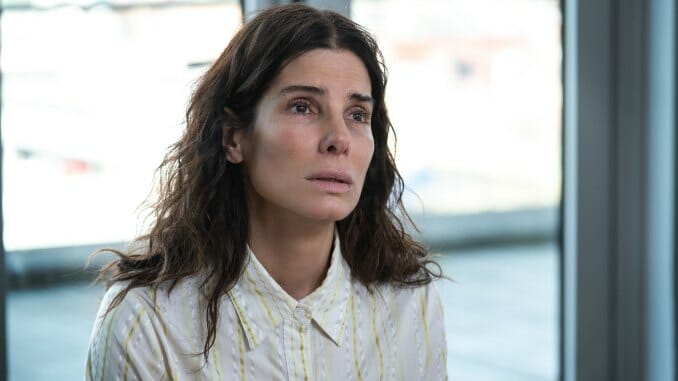The Unforgivable’s Title Is Truth in Advertising

When Nora Fingscheidt’s sophomore feature, The Unforgivable, slowly grinds to a conclusion after 114 grueling minutes of indecisive storytelling, one question lingers unanswered: Just who the hell is the title referring to? Who in this film is utterly beyond redemption? Who screws up so badly that, when all’s said and done and Netflix zaps the screen down to the size of a sticky note and cajoles you into queuing up the next round of content slop, they aren’t worth a second chance? Who can’t, who shan’t, we forgive?
Fingscheidt’s not telling. We have to guess for ourselves. Is it Ruth (Sandra Bullock), the martyr and mama bear putting herself through a meat grinder to protect her loved one? Steve Whelan (Will Pullen), son of the late Sheriff Mac Whelan (W. Earl Brown), itching to avenge his dad’s slaying years prior to the film’s events? Michael and Rachel Malcolm (Richard Thomas and Linda Emond), the greatest obstacles standing between Ruth and her long-lost sister, Katie (Aisling Franciosi), whom they adopted following a childhood tragedy she’s mercifully forgotten? Is the American penal system unforgivable? Is hiring Viola Davis for about ten minutes of screen time unforgivable?
Maybe compressing a TV series down into cinema is the greatest crime here; The Unforgivable’s countless structural problems make that case without even trying. Fingscheidt—along with screenwriters Peter Craig, Hillary Seitz and Courtenay Miles—has adapted The Unforgivable from Sally Wainwright’s 2009 British miniseries Unforgiven, without pausing to consider the differences between mediums and the tricks to remaking television into a movie. Wainwright chose her platform. So did Fingscheidt, in all fairness, but picking the movies as a vehicle for the same narrative requires forethought and appreciation for what defines “the movies.” Self-containment is key, and The Unforgivable can’t contain itself.
-

-

-

-

-

-

-

-

-

-

-

-

-

-

-

-

-

-

-

-

-

-

-

-

-

-

-

-

-

-

-

-

-

-

-

-

-

-

-

-








































